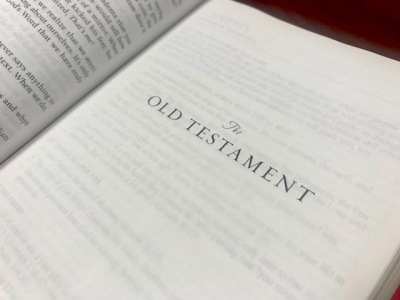Theologians react to Andy Stanley saying Ten Commandments don’t apply to Christians

Some theologians have taken issue with Andy Stanley’s recent column claiming that the Ten Commandments do not apply to Christians.
In an opinion column published earlier this month by Relevant Magazine, Stanley discussed the tendency of many American Christians to erect Ten Commandments displays.
"[I]f we’re going to create a monument to stand as a testament to our faith, shouldn’t it at least be a monument of something that actually applies to us?" he posed.
“Participants in the new covenant (that’s Christians) are not required to obey any of the commandments found in the first part of their Bibles. Participants in the new covenant are expected to obey the single command Jesus issued as part of his new covenant: as I have loved you, so you must love one another.”
Stanley added that he believed many of the evils committed by churches over history were connected to mixing aspects of the old covenant with Christianity and that although “Jesus was foreshadowed in the old covenant, he did not come to extend it.”
Richard Land, president of Southern Evangelical Seminary and executive editor of The Christian Post, told CP last Thursday that he believed Stanley “confuses ‘new’ with ‘fulfillment.’”
“In Matthew chapter 5, Jesus said that He came to fulfill the Old Testament law, to complete it. And to supplant it, but that does not mean that the Ten Commandments are irrelevant,” said Land.
“Jesus said that He didn’t come to take away from the law, that if you read Matthew chapter 5, ‘not one jot or tittle would be taken away.’ He came to fulfill it, not to abolish it. That’s Jesus.”
Land also told CP that Jesus gave a “greater spiritual understanding that no one can keep the law and that the law was not there to justify us before God, the law is there to teach us about the need for a savior who came in the fullness of time.”
Regarding the issue of Ten Commandments displays, Land defended the practice, stating that, along with other historic documents, they are “the basis for American civilization.”
“If you read the Constitution, if you read English common law, it’s based on the Ten Commandments. That’s why you have the Ten Commandments up in the Supreme Court,” Land added.
“Not as a testimony to Judeo-Christian belief, but because they are the basis along with other things like the Code of Hammarabi, they’re the basis of English-speaking western legal tradition for over a millennium.”
Samuel Lamerson, president of Knox Theological Seminary and a professor of New Testament, told CP that while he considered Stanley to be “a brother,” he disagreed with his column.
“What does doing away with the Ten Commandments really mean? Is it okay to steal, then? The famous preacher Charles Spurgeon said this, ‘If you don't believe in the Ten Commandments I can still believe you are a Christian, but I wouldn't want you around my silverware,’” Lamerson said.
“The difference between the 'old and new covenant' and thus the outmoded nature of the Hebrew Bible is not one that all Christians hold to.”
Lamerson did believe that Stanley’s concerns about the nature of modern American church and how it interprets scripture were not without some merit.
“I do feel that a large group of the Christian church has become mean and hateful. Christ's call for us to love one another is a critically important command,” continued Lamerson.

“Those who love one another don't kill, steal, hate, or do any of the things that the Commandments rule against. I feel pretty certain that this is what Pastor Stanley meant and with that I am 100 percent on board.”
Stanley's column comments echoed arguments he made in his book, Irresistible: Reclaiming the New that Jesus Unleashed for the World, which was released last September.
In the book, Stanley spoke about "old covenant leftovers," stating that he believed Christians had "an uncomfortable history and habit of selectively rebranding aspects of God's covenant with Israel and smuggling them into the ekklesia of Jesus."
Stanley wrote that while the covenant God made with ancient Israel was "divinely ordained," it was also "temporary," adding, "Careless mixing and matching of old and new covenant values and imperatives make the current version of our faith unnecessarily resistible."
Jeffrey Volkmer, professor of Old Testament at Biola University, told CP that the debate within Christianity as to how to treat the Old Testament has existed since “its inception.”
Volkmer said that he believed Stanley was “absolutely right” in his concern over “mix and match theology,” saying that such an approach “is simply not the proper disposition the New Testament believer ought to have toward the Old Testament.”
“Yet in response to this blind spot in the theology of many modern Christians, Stanley's solution is to basically adopt the position of radical discontinuity,” said Volkmer, “but the New Testament itself does not support such a view of the Old Testament.”
Volkmer cited multiple examples from the New Testament in which Jesus or the Apostles preached the Good News with the Old Testament as their basis.
“On the road to Emmaus when His followers do not recognize Him, Jesus, ‘Beginning with Moses and all of the Prophets, He interpreted for them the things concerning Himself in all the Scriptures’ (Luke 24.27),” explained Volkmer. “Here, Jesus gives the most epic Sunday school lesson in the history of mankind with nothing but the Old Testament.”
“In the opening days of the Church, the disciples were characterized by four things: ‘And they devoted themselves to the apostles' teaching, to fellowship, to the breaking of bread, and to prayer’ (Acts 2.42). Since these gatherings and activities were taking place well before any book of the New Testament was written, the 'apostle's teaching' was from the Old Testament—the early Church grew by the thousands with preaching only from the Old Testament.”
Volkmer told CP that according to the Bible, the Ten Commandments do not just apply to Christians but to everyone, and reiterated his concern about the habits of some to ditch the Old Testament.
“When you kick out the Old Testament from the Bible and also the life of the Christian, you do not get the right Jesus,” Volkmer continued.
“Stanley states, ‘He came to fulfill it, put a bow on it, and establish something entirely new.’ He did not. He came not to establish something ‘new’ but to complete something that He started in Genesis 1.”



























